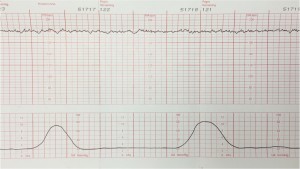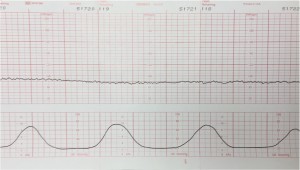The baseline fetal heart rate is normally between 110 and 160 beats per minute.
This seems to be the range that the normal, healthy fetus prefers to keep itself well-supplied with oxygen and nutrients. In this range, fetal tissues are perfused and fetal waste products removed through fetal urine and the placenta.
The fetal heart can beat more quickly, but only at a cost of increased energy utilization that would not normally be justified. The heart can beat slower, but if the slower heart rate is prolonged, it can lead to decreased fetal tissue perfusion and progressive tissue oxygen debt.
Tachycardia
Tachycardia is the sustained elevation of fetal heart rate baseline above a 160 BPM.

Tachycardia can be a normal response to some increased need for oxygen, for example:
- Increased fetal activity (everyone’s heart rate goes up when we exercise)
- Maternal fever (With an elevated maternal core temperature, all fetal enzyme systems speed up, increasing the need for oxygen on a metabolic basis, and driving up the fetal heart rate to compensate.)
Tachycardia can also increase in the presence of more worrisome problems, including:
- Chorioamnionitis
- Maternal hypothyroidism
- Drugs (Tocolytic drugs, Vistaril, etc.)
- Fetal hypoxia
- Fetal anemia
- Fetal heart failure
- Fetal arrhythmias
Most tachycardias are not indicative of imminent fetal jeopardy, particularly in the absence of any other FHR abnormalities.
Bradycardia
Bradycardia is the sustained depression of fetal heart rate baseline below 110 BPM.

Most of these are caused by increased vagal tone, although congenital cardiac abnormalities can also be responsible. Some reflect profound fetal acidosis with resulting cardiac suppression.
Mild bradycardia (to 80 or 90 BPM) with retention of baseline variability is common during the second stage of labor and not of great concern so long as delivery occurs relatively soon.
Moderate to severe bradycardia (below 80 BPM) with loss of variability, particularly in association with late decelerations, is more troubling and may indicate fetal intolerance of labor, requiring prompt resolution.
